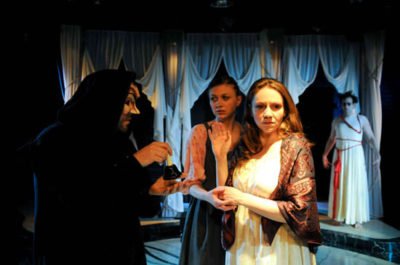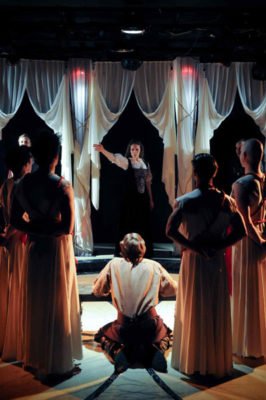The Duchess of Malfi
By John Webster

Adapted by Brandon Bruce & Christine Scarfuto
Directed by Braandon Bruce
At Strawdog Theatre Company, Chicago
Poor diction and rapid-fire speech dilutes ambitious adaptation of Webster’s The Duchess of Malfi
Based on actual events in the Italian Court of the 16th Century and first mounted at the Globe Theatre in 1613, John Webster’s Jacobean macabre tragic drama, The Duchess of Malfi is an indeed tough play to mount on a contemporary stage. The work is filled with dry poetic language that would challenge the most gifted Shakespearean players and in the hands of non-Equity actors sounded odd. Director Brandon Bruce (also with Christine Scarfuto adapted the play) found some theatrically interesting staging techniques to spice up the dark story of misuse of power, revenge, the status of women, cruelty, and incest. Utilizing a five man chorus, dressed in ancient white togas, the chorus underscored the show’s action, delivered songs, made suggestive movements and acted-out several characters including mad men. This element was both a distraction and an artistic achievement depending how and where it was employed.
The story of the widowed Duchess (Justine C. Turner) whose secret marriage to Antonio (Stephen Dunn) is a breach of Christian piety and scorned by her two brothers: The Cardinal (Christopher Walsh) and Ferdinand (John Taflan). The brothers were motivated by greed and incestuous lust. Once they learn about the marriage they unleash a storm of murderous revenge. True to the play’s Jacobean drama and Elizabethan tragedy, the show contains loads of stage violence and horror. I applaud the valiant effort by director Bruce and his dedicated cast but I have several problems with the performance basics.
The screaming and over-the-top work by some, especially John Tafln’s manic Ferdinand quickly became tedious. Next, he and many of the principal players (except the commanding Christopher M. Walsh) spoke their lines in that hard to understand rapid-fire-fast-talking-speech-pattern that made most of the dialogue sound the same. The poor diction and lack of enunciation was so annoying that I lost the much of the meanings . When actors speak so fast with the same cadence, their dialogue sounds like they “learned their lines” but didn’t understand what they were saying-hence most lines had the same emphasis in the same places. True speech seldom sounds like that. A dialect/vocal coach would help get the actors to slow down and enunciate.
I may be too sensitive to fast-talking actors who have trouble with verse dialogue, but several audience members complained after the show that they had trouble understanding The Duchess, Bozola (Joshua Davis), Antonio, and Ferdinand. I believe that once the main players slow down and articulate their dialogue, The Duchess of Malfi will be a worthy presentation of a classic 17th Century Elizabethan tragedy.
Somewhat Recommended
Tom Williams
Talk Theatre in Chicago podcast
Date Reviewed: April 22, 2012
For more info checkout The Duchess of Malfi page at theatreinchicago.com
At Strawdog Theatre, 3829 N. Broadway, Chicago, IL, www.strawdog.org, tickets $28, Thursdays thru Saturdays at 8 pm, Sundays at 4 pm, running time is 2 hours, 20 minutes with intermission, through May 26, 2012


